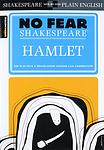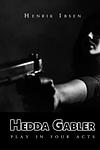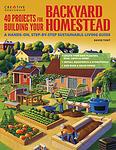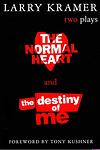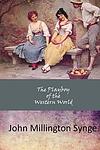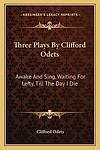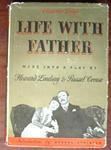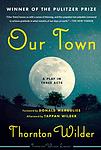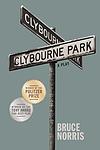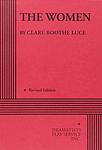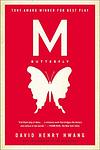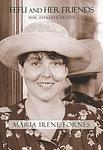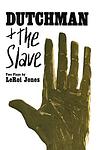The 50 Best Plays of All Time
This is one of the 284 lists we use to generate our main The Greatest Books list.
-
Hamlet by William Shakespeare
This classic play revolves around the young Prince of Denmark who is thrown into a state of emotional turmoil after his father's sudden death and his mother's quick remarriage to his uncle. The prince is visited by the ghost of his father who reveals that he was murdered by the uncle, prompting the prince to seek revenge. The narrative explores themes of madness, revenge, and moral corruption as the prince navigates the complex political and emotional landscape of the Danish court.
-
Long Day's Journey Into Night by Eugene O'Neill
"Long Day's Journey Into Night" is a semi-autobiographical play that explores the complex dynamics of a family tormented by addiction and regret. The narrative follows the Tyrone family, composed of two parents and their two adult sons, over the course of a single day. As the day progresses, the family members engage in soul-baring conversations that reveal their individual struggles with alcohol and drug addiction, their deep-seated resentments, and the love that binds them together despite their flaws. The play is a poignant examination of the human condition, familial bonds, and the destructive power of addiction.
-
Who's Afraid Of Virginia Woolf? by Edward Albee
The play is a darkly comedic exploration of the complexities of marriage and personal disillusionment. Set over the course of a single evening, it follows an older couple, George and Martha, who, after a faculty party, invite a younger couple, Nick and Honey, to their home for late-night drinks. As the night progresses, George and Martha engage in increasingly vicious verbal battles in front of their guests, using them as pawns in their psychological warfare. The play delves into themes of reality versus illusion, as the characters' secrets and personal failures are exposed, revealing the deep-seated unhappiness and dysfunction at the heart of their relationships.
-
Death Of A Salesman by Arthur Miller
This classic play explores the life of a failing salesman who, in his quest for the American Dream, struggles with his relationships and his own sense of reality. The protagonist's life spirals into despair as he grapples with his unfulfilled ambitions, strained family dynamics, and ultimately, his own mortality. The narrative delves deep into the themes of identity, illusion, and the destructive nature of the American Dream.
-
Oedipus the King by Sophocles
"Oedipus the King" is a tragic play that revolves around the life of Oedipus, the king of Thebes, who is prophesied to kill his father and marry his mother. Despite his attempts to avoid this fate, Oedipus unknowingly fulfills the prophecy. When he discovers the truth about his actions, he blinds himself in despair. The play explores themes of fate, free will, and the quest for truth, highlighting the tragic consequences of human hubris and ignorance.
-
Angels In America by Tony Kushner
The play is a profound and complex exploration of the AIDS crisis in the 1980s, intertwining the lives of several characters grappling with their sexuality, religion, and politics. Set against the backdrop of a conservative Reagan-era America, it delves into themes of abandonment, race, and the supernatural, as characters confront personal and societal challenges. The narrative weaves together the stories of a gay man diagnosed with AIDS, his closeted and conflicted lover, a Mormon couple facing their own crises, and a notorious real-life lawyer, Roy Cohn, also battling AIDS. Ethereal beings, including a heralding angel, intersect with the characters' lives, adding a fantastical dimension to the play's commentary on human suffering, redemption, and the quest for justice and love.
-
The Glass Menagerie by Tennessee Williams
A memory play set in St. Louis during the Great Depression, it follows the story of the Wingfield family. The protagonist, Tom, struggles with his role as the breadwinner for his overbearing mother, Amanda, and his physically and emotionally fragile sister, Laura, who spends her time with her collection of glass animals. The family's life takes a turn when Tom invites a gentleman caller home for dinner to meet Laura, causing tensions to rise and secrets to unfold.
-
A Raisin In The Sun by Lorraine Hansberry
The play explores the dreams and struggles of a Black family living on Chicago's South Side in the 1950s. When the family receives a $10,000 insurance check after the father's death, each member has different ideas about how to use the money. The mother wishes to buy a house to fulfill her late husband's dream of providing a better home for the family, while her son wants to invest in a liquor store to secure their financial future. The daughter seeks to use part of the money for her medical school tuition. Their conflicting aspirations and the pervasive racism of the era put a strain on the family's unity and values, as they strive to find their place in a world that often seems to work against them.
-
Woyzeck by Georg Buchner
The narrative revolves around a lowly soldier named Franz Woyzeck, who struggles with mental instability and social oppression. Tormented by hallucinations and subjected to inhumane medical experiments, he grapples with jealousy and existential angst. His descent into madness is exacerbated by his fraught relationship with Marie, the mother of his child, who becomes involved with another man. Woyzeck's growing paranoia and alienation culminate in a tragic act of violence, reflecting the dehumanizing effects of poverty and the destructive power of societal forces on the individual psyche.
-
Waiting for Godot by Samuel Beckett
"Waiting for Godot" is a play that explores themes of existentialism, despair, and the human condition through the story of two characters, Vladimir and Estragon, who wait endlessly for a man named Godot, who never arrives. While they wait, they engage in a variety of discussions and encounter three other characters. The play is characterized by its minimalistic setting and lack of a traditional plot, leaving much to interpretation.
-
The Bald Soprano by Eugène Ionesco
"The Bald Soprano" is a play that explores the absurdity of everyday life through a nonsensical narrative. It revolves around two middle-class English couples, the Smiths and the Martins, who engage in meaningless and repetitive conversations. The play is known for its unconventional structure, lack of plot, and the characters' surreal behavior, which are all used to satirize the banality and futility of routine and social norms. The title refers to a character who is never seen or mentioned again after the opening scene.
-
Look Back In Anger by John Osborne
The play centers around Jimmy Porter, an intelligent and educated but disaffected young man of working-class origin who is married to Alison, a woman from a more privileged background. Set in post-war Britain, the narrative captures the couple's volatile relationship and Jimmy's frustration with the lack of opportunities and the class structure that he feels traps him. The arrival of Alison's friend, Helena, adds further tension as she both criticizes and is attracted to Jimmy's raw passion. Themes of anger, class conflict, and disillusionment with the establishment are woven throughout the play, which ultimately explores the complexities of human relationships and societal expectations.
-
Hedda Gabler by Henrik Ibsen
"Hedda Gabler" is a dramatic play that centers on the life of its titular character, a woman trapped in a loveless marriage with a dull, reliable husband. She is bored with her life and longs for freedom and excitement. Her desire for control and power leads her to manipulate those around her, resulting in tragic consequences. The play explores themes of societal expectations, personal freedom, and the destructive power of boredom.
-
The Homecoming by Harold Pinter
"The Homecoming" is a play that delves into the complex dynamics of a dysfunctional family when the eldest son returns home after a long absence. Set in North London, the story unfolds in the family's house, where the son introduces his wife to his domineering father, his uncle, and his two brothers. Tensions rise as the family's power struggles and hidden resentments come to the fore, leading to a shocking and unsettling realignment of relationships within the household. The play explores themes of power, sexuality, and the search for identity within the confines of a seemingly traditional family structure.
-
Machinal by Sophie Treadwell
The play is a powerful expressionist work that follows the life of a young woman who feels trapped and dehumanized by the societal expectations and mechanical nature of the early 20th-century urban environment. She is suffocated by her mundane job, an oppressive marriage to her boss, and the overall constraints of a patriarchal society. Her desperate longing for freedom and individuality leads her down a dark path that culminates in a shocking and tragic act, ultimately resulting in her entanglement with the justice system. The narrative is a critique of the industrial age and its impact on the human spirit, exploring themes of autonomy, alienation, and the crushing force of societal norms.
-
Fences by August Wilson
The play explores the life of an African American family in the 1950s, focusing on the complex relationships between a father, who once aspired to be a professional baseball player but was thwarted by racial discrimination, and his family. The father's bitterness and frustrations over his unfulfilled dreams and the racial barriers of his time manifest in his relationships with his sons, who have their own hopes and ambitions. The narrative delves into themes of generational conflict, racial inequality, and the struggle for personal fulfillment, all symbolized by the fence the father builds around his yard, which serves as a metaphor for both division and protection.
-
Uncle Vanya by Anton Chekhov
"Uncle Vanya" is a play that explores the themes of existential boredom and human folly through the story of an elderly professor and his young wife visiting their rural estate run by the professor's brother-in-law, Vanya, and daughter, Sonya. The visit disrupts the monotonous life of the estate, leading to emotional chaos, unrequited love, and a failed murder attempt. The play ends with the departure of the professor and his wife, leaving Vanya and Sonya to return to their life of drudgery, finding solace in the hope of a better life in the afterlife.
-
Tartuffe by Molière
This classic French play revolves around the character Tartuffe, a hypocritical and cunning man who pretends to be deeply pious and religious. He manages to deceive Orgon, a wealthy family patriarch, into believing in his piety. Orgon is so taken in by Tartuffe that he decides to marry him off to his daughter, despite her love for another man. The family works together to expose Tartuffe's true nature, leading to a series of comic and dramatic events. The play is a satirical critique of religious hypocrisy and gullibility.
-
What The Butler Saw by Joe Orton
The play is a farcical comedy that delves into the chaotic world of Dr. Prentice, a psychiatrist, whose attempts to seduce his attractive prospective secretary, Geraldine Barclay, spiral out of control with the unexpected arrival of his wife, the government inspector Dr. Rance, and a bellboy who blackmails him. Set in a psychiatric clinic, the plot involves mistaken identities, cross-dressing, and ludicrous misunderstandings. The narrative satirizes the absurdities of psychiatry, sexual mores, and the British establishment, culminating in a whirlwind of comic situations that challenge social norms and the concept of "normalcy."
-
Uncommon Women And Others by Wendy Wasserstein
This play delves into the lives and relationships of a group of female friends who reunite six years after graduating from Mount Holyoke College. Through a series of flashbacks, the narrative explores their experiences as they navigate the complexities of womanhood, ambition, and societal expectations in the 1970s. The characters confront issues such as sexuality, feminism, and the pressure to succeed, revealing the unique challenges faced by women of their generation. The reunion prompts reflection on their past choices and the paths they've taken, highlighting the diverse ways in which they've either conformed to or rebelled against the traditional roles assigned to them.
-
This Is Our Youth by Kenneth Lonergan
The play captures the lives of three disillusioned youths navigating the transition from teenage to adult life in the Reagan-era Upper West Side of Manhattan. Over the course of two days, these privileged yet dysfunctional young adults wrestle with issues of loyalty, ambition, and self-identity. As they struggle with their relationships and future prospects, they reveal the angst and challenges of a generation at odds with the expectations of the world around them, all while dealing with the consequences of their own reckless decisions.
-
Rosencrantz & Guildenstern Are Dead by Tom Stoppard
The play is an absurdist, existential tragicomedy that follows two minor characters from Shakespeare's "Hamlet," Rosencrantz and Guildenstern, who are now the protagonists in their own story. As they stumble through philosophical debates and encounter a troupe of actors while trying to understand the nature of reality and their own existence, they find themselves increasingly out of their depth in a world where they have little control over their fate. The narrative weaves in and out of events from "Hamlet," offering a humorous and poignant perspective on free will, chance, and the search for meaning in a seemingly indifferent universe.
-
The Normal Heart by Larry Kramer
The play is a searing drama set during the early years of the AIDS crisis in New York City. It follows the passionate and outspoken protagonist, a gay Jewish-American writer and activist, as he forms an organization to raise awareness about the mysterious disease decimating the gay community. Battling against indifference, denial, and political obstacles, he confronts the realities of the epidemic, the limitations of the healthcare system, and the personal toll of the crisis, including the impact on his own relationships. Through his journey, the play exposes the fear, anger, and heartbreak experienced by those at the forefront of the struggle, while also serving as a powerful call to action against ignorance and apathy.
-
Topdog Underdog by Suzan-Lori Parks
The play centers around two African American brothers, Lincoln and Booth, who share a tenuous and competitive relationship marked by a troubled past. Lincoln, a former street hustler, now works as a Lincoln impersonator in a shooting gallery, while Booth aspires to be the greatest card hustler, practicing the three-card monte con that Lincoln has abandoned. As they navigate their sibling rivalry, the brothers grapple with their roles as the "topdog" and the "underdog" in a cycle of poverty and broken dreams. The narrative delves into themes of identity, family dynamics, and the struggle for power, culminating in a dramatic and tragic exploration of fate and the inescapable nature of their circumstances.
-
Candida: a Pleasant Play by George Bernard Shaw
This play revolves around the love triangle between a clergyman, his wife, and a young poet who idolizes her. The clergyman, who is a popular Christian Socialist, is oblivious to the poet's infatuation with his wife. The poet eventually confesses his love and proposes a "bidding" for Candida's affection, where both men will state their cases as to why she should choose them. In the end, Candida chooses her husband, stating that he is the one who truly needs her.
-
The Playboy Of The Western World by John Millington Synge
"The Playboy of the Western World" is a comedic play that centers around Christy Mahon, a young man who stumbles into a rural tavern in County Mayo, Ireland, claiming to have killed his father. His tale unexpectedly elevates his status among the villagers, who find his boldness and story intriguing. As Christy enjoys his newfound popularity and the affection of the local women, complications arise when the truth about his father's fate comes to light. The play explores themes of heroism, identity, and the Irish rural life, using rich language and dramatic irony to critique societal norms and romanticized perceptions of rebellion.
-
The Importance of Being Earnest by Oscar Wilde
This comedic play revolves around two protagonists who both use the pseudonym "Ernest" to escape their social obligations. Their plans unravel when they fall in love and their betrothed women reveal they are only willing to marry men named Ernest. The situation is further complicated by a case of mistaken identity, a lost handbag, and a surprising revelation about one of the protagonist's parentage. The play uses wit and humor to satirize the social conventions of Victorian England, particularly the importance placed on trivialities.
-
Awake And Sing! by Clifford Odets
The play is a poignant exploration of the Berger family's struggles during the Great Depression in the Bronx, New York. It centers around Bessie Berger, a matriarch determined to keep her family afloat amidst economic hardships, conflicting ideals, and the pursuit of the American Dream. Through the interwoven lives of her idealistic son Ralph, disillusioned husband Myron, and rebellious daughter Hennie, the narrative delves into themes of hope, disillusionment, and the quest for a better life. The characters grapple with their individual aspirations and the harsh realities of their circumstances, revealing the resilience of the human spirit in the face of adversity.
-
The School For Scandal by Richard Brinsley Sheridan
The play is a satirical depiction of the gossip and hypocrisy found in the high society of 18th century London. It centers around two brothers with contrasting personalities, one appearing to be a model of virtue and the other a dissolute rake, and the schemes of a circle of wealthy, idle gossipmongers. The plot thickens with a series of misunderstandings, eavesdropping, and mistaken identities, all revolving around the brothers' romantic pursuits and the malicious spread of scandal. The narrative ultimately exposes the true characters of the individuals involved, revealing the seemingly virtuous brother to be hypocritical and the seemingly dissolute one to be honorable, thus critiquing the superficial judgments and moral corruption of the elite.
-
Stuff Happens by David Hare
"Stuff Happens" is a compelling work of documentary theater that offers a dramatized account of the events leading up to the Iraq War, focusing on the political maneuvers and discussions among high-ranking officials in the United States and the United Kingdom. Through a series of incisive scenes and sharp dialogue, the play explores the complex motivations, negotiations, and decisions that shaped the path to conflict, shedding light on the roles of key figures such as the US President, the British Prime Minister, and their respective cabinets. The narrative critically examines the justifications for war and the influence of power and ideology on international relations, inviting audiences to reflect on the nature of modern governance and the consequences of political actions.
-
Life With Father by Howard Lindsay, Russell Crouse
"Life With Father" is a humorous and affectionate recounting of a family's daily life in late 19th-century America, centered around the domineering yet endearing figure of the father. The story unfolds through a series of vignettes that capture the trials and tribulations of managing a household with a strict, blustering patriarch, his resourceful wife, and their lively brood of sons. The narrative, rich with period detail and wry observations, highlights the clash between the father's traditional values and the inevitable changes brought about by time, as well as the love and warmth that underpin the family's interactions, despite the frequent comedic misunderstandings and the father's attempts to maintain absolute authority.
-
Twelfth Night: Or, What You Will by William Shakespeare
Twelfth Night: Or, What You Will is a comedic play that revolves around mistaken identities and love triangles. The story follows the adventures of Viola, who, after being shipwrecked and separated from her twin brother Sebastian, disguises herself as a man named Cesario. As Cesario, she enters the service of Duke Orsino and falls in love with him, even as he sends her to woo the Countess Olivia on his behalf. However, Olivia falls in love with Cesario, not knowing he is actually Viola in disguise. Further confusion ensues when Viola's presumed-dead brother Sebastian arrives, leading to mistaken identities, hilarious mix-ups, and ultimately, happy resolutions.
-
Cloud 9 by Caryl Churchill
"Cloud 9" is a provocative play that explores themes of sexual politics and colonial oppression through a non-linear structure and gender-bending characters. The two-act play juxtaposes the Victorian era with the late 20th century, challenging societal norms and expectations. In the first act, set in colonial Africa, characters grapple with the constraints of their roles within the rigid British Empire, while the second act, set in London, shows the same characters only 25 years later, despite a century having passed, dealing with the fallout of their past and the complexities of their identities in a more modern world. The play uses role reversal and time shifts to question power dynamics and the nature of liberation.
-
Volpone by Ben Jonson
"Volpone" is a satirical comedy set in 17th century Venice, where the cunning protagonist, Volpone, and his servant, Mosca, swindle the city's wealthy elite by pretending Volpone is on his deathbed and in need of a worthy heir. This prompts a series of greedy contenders who offer extravagant gifts in hope of being named the heir. Despite their successful deceit, their scheme is eventually exposed, leading to their downfall. The story serves as a critique of greed and corruption, highlighting the destructive power of unchecked ambition.
-
Ruined by Lynn Nottage
The play is a gripping tale set in a small mining town in the war-torn Democratic Republic of Congo. It centers on the struggles of women who seek refuge in a bar and brothel run by a shrewd businesswoman who both protects and profits from her customers. The narrative delves into the complex relationships and survival strategies in a land ravaged by civil war, focusing on the resilience of women facing unspeakable hardships, their sense of community, and the human capacity for endurance amidst a landscape of moral ambiguity and ruin.
-
Our Town by Thornton Wilder
This play is a poignant depiction of life in a small American town called Grover's Corners, New Hampshire, at the turn of the 20th century. Through the everyday lives of its citizens, the narrative explores universal themes of love, marriage, mortality, and the passage of time. The story is narrated by a stage manager who directly addresses the audience and interacts with the characters, guiding viewers through the experiences of two families, the Gibbs and the Webbs. The play's minimalist staging and meta-theatrical elements emphasize the ephemeral nature of human existence, encouraging the audience to appreciate the beauty of life's ordinary moments.
-
The Vortex by Noel Coward
The play is a provocative drama that delves into the lives of a high-society mother and her son, both entangled in a web of self-indulgence and addiction. The mother, a narcissistic and aging beauty, is involved in a series of shallow love affairs, while her son grapples with a spiraling drug addiction. Their dysfunctional relationship comes to a head when the son returns home from abroad, leading to a confrontation that exposes the emotional voids within their glamorous but hollow lives. The play is a critique of the hedonistic lifestyle of the British upper class in the 1920s and explores themes of family dynamics, the pursuit of youth, and the destructive nature of addiction.
-
She Stoops to Conquer by Oliver Goldsmith
"She Stoops to Conquer" is a comedic play that revolves around the story of a wealthy countryman, Mr. Hardcastle, who arranges for his daughter, Kate, to meet Charles Marlow, the son of a wealthy Londoner, hoping the pair will marry. However, Marlow is nervous around upper-class women, yet gets along fine with lower-class women. Kate learns of this and pretends to be 'common' to get to know him. The play concludes with Kate revealing her true identity, and Marlow, who is in love by this point, is relieved she's actually of the upper class. The play explores themes of class, courtship, and the deceptive nature of appearances.
-
Mother Courage and Her Children by Bertolt Brecht
Set against the backdrop of the Thirty Years' War, the book tells the story of a canteen woman, Mother Courage, who pulls her cart with her three children across war-torn Europe. It explores her struggles and survival tactics as she tries to profit from the war while keeping her children safe. The narrative is a profound critique of war and its consequences, highlighting the human cost of conflict and the often futile search for prosperity and security in a chaotic world.
-
John by Annie Baker
The play unfolds in a bed-and-breakfast in Gettysburg, Pennsylvania, where a young couple, Jenny and Elias, arrive to stay over the Thanksgiving weekend. Their relationship is tested by the eerie atmosphere of the B&B, the odd behavior of its peculiar proprietor, Mertis, and the presence of her enigmatic friend, Genevieve. As the weekend progresses, the couple's personal tensions and unresolved issues surface, with the intimate setting and the watchful eyes of the surrounding inanimate objects serving as a backdrop to the unraveling of secrets and the exploration of identity, perception, and the supernatural.
-
Clybourne Park by Bruce Norris
The play unfolds in two acts set fifty years apart, examining racial tensions and property ownership in a Chicago neighborhood. The first act takes place in the 1950s and revolves around a white couple who unwittingly sell their home to an African American family, sparking controversy among the white community. The second act is set in the same house in the present day, where the now predominantly African American neighborhood faces gentrification as a white couple plans to buy and renovate the historic home. The work cleverly juxtaposes the two eras, exploring themes of racism, community, and the evolution of attitudes toward race and real estate in America.
-
Master Harold...And The Boys by Athol Fugard
The play takes place in South Africa during the era of apartheid and revolves around the complex relationship between a young white boy and two black men who work in his mother's tea room. The boy has grown up with these men and shares a close bond with them, but as he struggles with personal turmoil and the pressures of the racist society around him, he begins to assert his racial superiority, leading to a devastating display of discrimination and the shattering of their familial relationship. The narrative explores themes of racism, human dignity, and the impact of societal injustice on personal relationships.
-
The Women by Clare Booth Luce
The play in question is a satirical commentary on the lives of Manhattan socialites and the pettiness of their ostensibly glamorous world. Through a cast composed entirely of women, it delves into themes of friendship, betrayal, and the cutthroat social standings of its characters. The narrative centers around the protagonist's discovery of her husband's infidelity and her subsequent journey through gossip, backstabbing, and the quest for personal growth and independence amidst the high society of the 1930s. The play is a sharp critique of the superficial relationships and the power dynamics among women within the upper crust of society.
-
The Humans by Stephen Karam
"The Humans" is a play that explores the complexities of family dynamics and the human condition through the lens of a Thanksgiving dinner at a run-down New York City apartment. The narrative delves into the fears, hopes, and secrets of the Blake family as they navigate issues such as aging, illness, economic instability, and the search for connection in a modern world. Throughout the dinner, the family's interactions reveal the fragility of their relationships and the strength of their bonds, painting a poignant and often humorous portrait of contemporary American life.
-
M. Butterfly by David Henry Hwang
In this dramatic play, an unconventional romance unfolds between a French diplomat and a mysterious Chinese opera singer. The diplomat becomes infatuated with the singer, who he believes to be a woman, only to have his perceptions of love, gender, and cultural identity challenged. As their affair deepens over two decades, the diplomat remains oblivious to the singer's true gender and the political espionage at play. The story, inspired by real events, ultimately explores themes of Orientalism, the fluidity of identity, and the devastating consequences of deception and self-delusion.
-
Fefu And Her Friends by María Irene Fornés
"Fefu and Her Friends" is a play that unfolds in the 1930s, centering around eight women who gather at the home of their eccentric friend for a reunion. Throughout the narrative, the characters engage in a series of intimate and revealing conversations that touch on various aspects of their lives, including their personal relationships, societal expectations, and the struggles they face as women. The play is notable for its experimental structure, with the second act taking place in different rooms of the house simultaneously, inviting the audience to move around and experience the scenes in a non-linear fashion. This innovative approach allows for an immersive and personal encounter with the characters' lives, highlighting themes of feminism, friendship, and the complexities of female identity.
-
Short Eyes by Miguel Pinero
The book is a raw and unflinching portrayal of life inside a New York City prison, where the racial and social hierarchies of the inmates are stark and brutal. The narrative centers around the arrival of a new prisoner, who is accused of a heinous crime that makes him the target of the other inmates' scorn and violence. Known as "Short Eyes" to the prison population—a slang term for a child molester—the man's presence exposes the complex web of morality, survival, and power struggles that define the prison ecosystem. As tensions rise, the characters are forced to confront their own demons and the harsh realities of the penal system.
-
Everyman by Philip Roth
"Everyman" is a profound exploration of the common human experience as it recounts the life of its unnamed protagonist. The book explores themes of mortality, regret, and the human condition through the lens of an everyman character. The protagonist's journey through life, with all its joys, sorrows, achievements, and failures, is a contemplation on aging, death, and the inevitable decline of the body. The narrative is a stark and unflinching examination of the human experience, offering a poignant meditation on the nature of life, death, and humanity.
-
The Dutchman by Amiri Baraka
"The Dutchman" is a provocative play set on a New York City subway train, where a young African-American man, Clay, encounters Lula, a flirtatious and mysterious white woman. The play unfolds as a tense, psychological confrontation that escalates into a symbolic and violent exploration of racial dynamics and identity in 1960s America. Through their interaction, the narrative delves into themes of race, sexuality, and power, ultimately leading to a shocking and tragic climax that forces the audience to confront the social and political undercurrents of the era.
-
The Persians by Aeschylus
"The Persians" is an ancient Greek tragedy that tells the story of the Persian King Xerxes and his failed invasion of Greece. The narrative focuses on the aftermath of the Battle of Salamis, depicting the mourning of Xerxes' mother and the ghost of his father Darius, who prophesied the fall of the Persian Empire. It serves as a critique of the arrogance and hubris of Xerxes and a celebration of Greek victory, while also exploring themes of war, loss, and the consequences of ambition.
TimeOut, 50 Books
New York is practically synonymous with theater, and from Broadway to Off Broadway to Off-Off Broadway, there are countless opportunities to see top-notch dramatic works. Of the countless shows that have been produced since the dawn of performance, it’s nearly impossible to choose the best plays. But we’ve done just that with our list of the best plays of all time.
What does it mean to say which plays are the best? Quality, popularity, universality, influence and historical importance all factored into the decision-making process. From Greek tragedies and Shakespearean comedies to Tony Award winners and modern experimental theater, this opinionated list by the late theater journalist and critic and Andy Propst covers some truly excellent works
Added 2 months ago.
This list has a weight of 22%. To learn more about what this means please visit the Rankings page.
Here is a list of what is decreasing the importance of this list:
- Voters: 1 person voted
- List: only covers 1 specific genre
If you think this is incorrect please e-mail us at [email protected].
